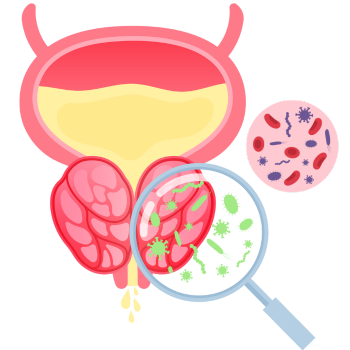BPH or enlarged prostate can cause problems passing urine and incontinence. Our urologists at KK Virat Hospital, Karimnagar, offer minimally invasive BPH treatments, including TURP, TUIP, TUMT, and advanced laser procedures like PVP, ThuLEP, and HOLEP. Consult our top BPH specialists for a free consultation today.
What is BPH?
Benign Prostatic Hyperplasia (BPH) is a condition where the prostate gland enlarges, causing difficulty in urination due to the narrowing of the urethra. It is estimated that over 70% of men above 50 years may develop BPH, with about 25% requiring surgical treatment. Though non-cancerous, the condition can significantly impact daily life.

Acupuncture Points for BPH
- BL23 (ShenShu)
- BL28 (Pang Guang Shu)
- BL32 (Ciliao)
- BL33 (Zhang Liao)
Complications
- Bladder stones
- Kidney damage
- Bladder damage
- Urinary tract infection
- Sudden inability to urinate
Risk Factors
- Obesity
- Diabetes
- Heredity
- Age factor
Foods to Avoid in BPH
- Soda
- Coffee
- Alcohol
- Saturated fats
- Caffeinated beverages
Diagnosis of BPH
Our specialists use a combination of physical examinations and diagnostic tests, such as:
Urodynamic and Pressure-Flow Studies
- Ultrasound – Helps detect abnormal growth and determine the extent of enlargement.
- Prostate-Specific Antigen (PSA) Test – Measures PSA levels to rule out prostate cancer.
- Urinary Flow Test – Assesses urine flow strength.
- Postvoid Residual Volume Test – Measures urine left in the bladder after urination.
- 24-hour Voiding Diary – Records urinary frequency and output.
- Urine & Blood Tests – Identifies infections and kidney function.
- Advanced Tests (for complex cases):
- Digital Rectal Exam
- Cystoscopy
- Prostate Biopsy
Best Treatments for Enlarged Prostate
Medications for BPH – Doctors may prescribe:
- Tadalafil (Cialis) – Sometimes prescribed for urinary symptoms.
- Alpha-Blockers – To relax prostate muscles.
- 5-Alpha Reductase Inhibitors (5-ARIs) – To shrink prostate size.
Minimally Invasive Surgical Treatments
For moderate to severe cases, surgical interventions include:
Transurethral Procedures:
- TURP (Transurethral Resection of the Prostate) – Removal of prostate tissue using a resectoscope.
- TUIP (Transurethral Incision of the Prostate) – Small incisions to reduce pressure on the urethra.
- TUMT (Transurethral Microwave Thermotherapy) – Uses microwaves to destroy excess tissue.
- Prostatectomy – Removal of the entire prostate in severe cases.
Advanced Laser Procedures:
ThuLEP (Thulium Laser Enucleation of the Prostate) – Similar to HOLEP, using Thulium laser.
PVP (Photoselective Vaporization of the Prostate) – Uses high-powered laser to vaporize excess tissue.
HOLEP (Holmium Laser Enucleation of the Prostate) – Removes obstructing prostate tissue with a laser.
Post-Surgery Care & Recovery
- Dedicated care coordinators assist with hospital admissions, insurance paperwork, and follow-up consultations.
- Advanced laser and laparoscopic procedures ensure faster recovery.
- Free post-surgery follow-ups, dietary guidance, and exercise plans for smooth recovery.
Managing Mild BPH Symptoms
- Reduce stress through exercise, yoga, and meditation.
- Empty bladder completely during urination.
- Avoid caffeine and alcohol, especially at night.
Medications to Avoid with BPH:
- Diuretics – Increase urine production.
- Antidepressants – Reduce bladder muscle contractions.
- Antihistamines & Decongestants – Can tighten prostate and bladder muscles.
- NSAIDs – May worsen urinary retention.
Possible Side Effects of BPH Surgeries
TURP:
- Retrograde ejaculation
- Urinary incontinence (temporary)
- Erectile dysfunction (rare)
- Urethral strictures
- Urinary infections
HOLEP:
- Infection risk
- Temporary bleeding and burning sensation
- Urinary incontinence
- Erectile dysfunction
Why Choose KK Virat Super Speciality Hospital for BPH Treatment?
KK Virat Super Speciality Hospital in Karimnagar is the top choice for BPH Treatment, offering expert care and state-of-the-art medical facilities. With 15+ years of experienced urologists, we ensure precise and effective BPH Treatment.
We provide insurance support, flexible payment options, along with our follow-up consultations, to ensure a smooth recovery.
Book Your Appointment Today
Seeking the best BPH Treatment in Karimnagar? Get in touch with our leading urologists today:
- Call Us Directly: Get in touch with our medical coordinators to schedule an appointment with an expert urologist.
- Direct Visit: You can visit our hospital directly by carrying your previous medical records if you have a medical history. However, admission will be based on the doctor’s recommendation.
What does a prostate gland do?
The prostate gland is a small, walnut-sized organ located below the bladder and in front of the rectum. Its primary function is to produce seminal fluid, which nourishes and transports sperm during ejaculation. It also helps regulate urine flow by surrounding the urethra.
Is BPH the same as prostate cancer?
No, Benign Prostatic Hyperplasia (BPH) is not the same as prostate cancer. BPH is a non-cancerous enlargement of the prostate gland, while prostate cancer occurs due to abnormal growth of malignant cells in the prostate. However, both conditions can cause similar urinary symptoms.
Can BPH lead to prostate cancer?
BPH itself does not lead to prostate cancer. However, both conditions can coexist in some individuals. Regular check-ups and PSA (Prostate-Specific Antigen) tests are recommended to differentiate between the two and detect any early signs of prostate cancer.
Which patients are most likely to develop BPH?
Men over the age of 50 are at a higher risk of developing BPH. Other risk factors include:
- Sedentary lifestyle
- A family history of BPH
- Obesity
- Diabetes and metabolic syndrome
- Hormonal imbalances
Can BPH lead to prostatitis?
Yes, BPH can sometimes contribute to prostatitis, which is inflammation or infection of the prostate gland. An enlarged prostate can obstruct urine flow, leading to bacterial infections and irritation, increasing the likelihood of prostatitis.
How does BPH affect urinary function?
BPH enlarges the prostate, which compresses the urethra and interferes with normal urine flow. Common urinary issues include:
- Urinary urgency and incontinence
- Frequent urination, especially at night (nocturia)
- Difficulty starting and stopping urination
- Weak urine stream
- A feeling of incomplete bladder emptying
What does the BPH treatment method depend on?
The choice of treatment depends on several factors, including:
- Response to previous treatments
- The severity of symptoms
- The size of the prostate
- The patient’s overall health condition
- Presence of complications like bladder stones or urinary retention
Can you treat enlarged prostate without surgery?
Yes, in mild to moderate cases, BPH can be managed without surgery using:
- Regular exercise and pelvic floor exercises
- Medications such as Alpha-blockers and 5-alpha reductase inhibitors
- Lifestyle changes (reducing caffeine/alcohol, avoiding late-night fluids)
- Dietary modifications (including more fiber and healthy fats)
However, if symptoms worsen or cause complications, surgery may be required.
What is the cost of prostate surgery in Karimnagar?
The cost of prostate surgery in Karimnagar varies based on factors like patient condition, hospital charges, type of surgery, surgeon’s expertise, and insurance coverage. It is best to consult KK Virat Hospital for an accurate estimate.
Is prostate operation painful?
Prostate surgeries, including TURP and laser procedures, are performed under anesthesia, so patients do not feel pain during the procedure. Post-surgery, mild discomfort, burning during urination, or temporary urinary incontinence may occur but can be managed with medications and recovery guidelines.
Can prostate enlargement cause erectile dysfunction?
While BPH itself does not directly cause erectile dysfunction (ED), it can contribute to sexual problems due to frequent urination, anxiety, and hormonal changes. Additionally, certain medications used to treat BPH may have side effects impacting sexual function.
What is TURP syndrome?
TURP syndrome is a rare but serious complication of Transurethral Resection of the Prostate (TURP) surgery. It occurs when the irrigation fluid used during the procedure enters the bloodstream, leading to symptoms such as nausea, confusion, low sodium levels, and high blood pressure. Proper surgical techniques help minimize this risk.
Can I get erectile dysfunction after surgery for BPH?
Some men may experience temporary erectile dysfunction after BPH surgery due to nerve irritation or post-surgical swelling. However, in most cases, sexual function improves over time. The risk of permanent ED is lower with modern minimally invasive procedures like HOLEP or laser surgeries.
What are the complications associated with untreated BPH?
If left untreated, BPH can lead to severe complications such as:
- Urinary retention (complete inability to urinate)
- Bladder stones (due to stagnant urine)
- Bladder damage (from prolonged obstruction)
- Kidney damage (due to backpressure on the kidneys)
- Frequent urinary tract infections (UTIs)
Early diagnosis and treatment can prevent these complications and improve quality of life.


